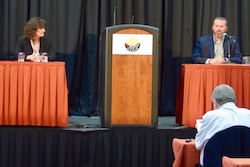 A new study shows that 27 percent of manufacturing in the U.S. is for farm equipment, employing more than 114,000 people and contributing 21 billion to the overall economy.
A new study shows that 27 percent of manufacturing in the U.S. is for farm equipment, employing more than 114,000 people and contributing 21 billion to the overall economy.
“A lot of people forget that agriculture matters to folks who don’t live on farms,” said Nick Tindall with the Association of Equipment Manufacturers (AEM) during a press conference at the recent Commodity Classic. He added that AEM will be sharing that message with lawmakers in discussions about the next farm bill. “I think that being from the heavy industry, heavy manufacturing sector we have the opportunity to go into offices and interject the angle that farm economy is very important to hundreds of thousands of people, as the economic study points out, who work in the agriculture manufacturing sector.”
AEM is also interested in ensuring wireless access comes to rural communities. As equipment becomes more and more complex, access to wireless affects a machine’s ability to function at its fullest extent.
Learn more about AEM’s plans for the future here: Association of Equipment Manufacturers Press Conference














